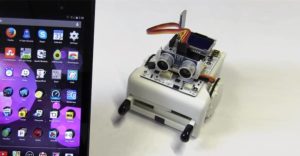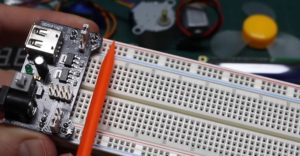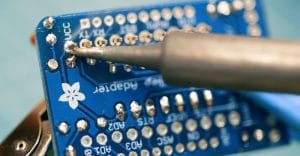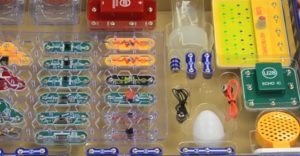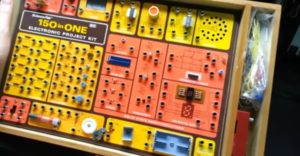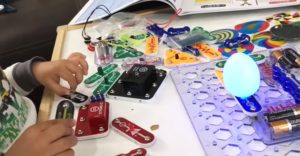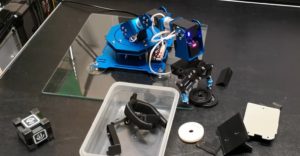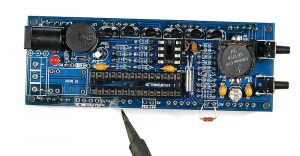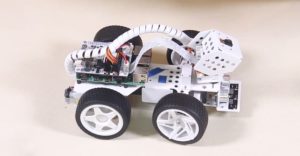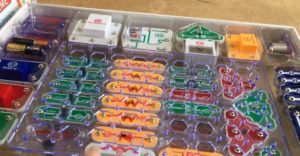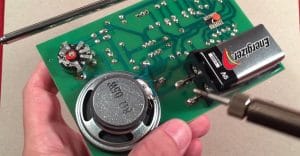Hey, guys! In this post I’m going to tell you about best electronic kits for beginners and how to choose them, but first I want to highlight the importance of hands-on activities in learning electronics. One of the best examples of hands-on activities is an electronic kit. It gives a possibility to learn through real experience and result. And it’s an absolutely perfect way for any beginner to get acquainted with the world of electronics!
My way to electronics began with very simple soldering project kits, and I really enjoyed my time building circuits and seeing the results. Since early years I was not only very curious about the presenсe of technology in our lives, but I realized the importance of it in the everyday routine. I was also very lucky to have my Dad who was ready to give a hand any moment I needed it, who encouraged me to go on and build my confidence and self-esteem. I used to make lots of mistakes with circuits, burned and broke many components, but I was learning and it was a great experience.
I say this only to motivate you and not underestimate the value of hands-on activities in the life of any person. Believe me, it’s easier and more productive to implement this active learning approach than force anyone, especially a kid, to read about theoretical issues. And it does really work!
What is an electronic kit?
Let me remind you what we mean talking about any electronic kit. It’s a package with various electrical components (capacitors, resistors, LEDs diodes, a board, a circuit diagrams, etc.) which are used to build an electronic device.
What to consider when buying an electronic kit?
There are several issues to consider before buying any electronic kit.
Type of a kit
First, you need to figure out what type of a kit you need. All electronic kits can be divided into two major categories: soldering and non-soldering.
It is not hard to guess that all soldering kits require soldering. It means that in order to build a circuit or a project it is necessary to solder the components included in the kit.
TIP: It might happen that you don’t have any soldering equipment yet and don’t plan to buy it in the nearest future or ever. If so, it’s better to buy a kit with all the tools necessary for soldering: a soldering iron, wire cutters, solder wick (for removing excess amount of solder or “solder bridges” between components), etc. However, there is a chance that after successful completion of the first soldering project, you would love to improve your soldering skills and increase your level of expertise, then it would be better to have your own soldering equipment.
Soldering kits are great to learn electronics: they allow you to gain practical knowledge, i.e. learn how the circuit work, and more. Typically, these kits come with all electronic components; and to accomplish a project you need to follow the instructions included in the kit. These instructions could be in the form of a lesson manual or a video. The only disadvantage of any soldering kit is that you would be able to make only one project.
When it comes to non-soldering or solder-free kits, I would refer to simple mechanical kits, snap circuits kits, breadboard kits, and coding ones.
Mechanical kits would allow you build many different models, for instance, cars, cranes, planes, and more. Here the possibilities are limited only by the imagination of a person completing the projects.
With snap circuits kits (here my review “Best Snap Circuits Kits: how to make a right choice”) learning electronics is lots of fun. Neither soldering nor other tools are required. In order to make circuits you need to mount the parts on plastic grid and snap them with each other.
Modern breadboards kits are for those who would like to learn how to prototype circuits. It’s not that difficult to build electronic circuits using breadboards. You need to push electronic components into the mounting holes according to certain rules. You can create lots of circuits, starting from the simple ones to more sophisticated with automatically flashing lights, etc.
There are many DIY electronic kits for beginners requiring coding: Arduino and Raspberry projects, for example. These coding kits are great tools that would teach you cause and effect, logic, and help to develop problem-solving skills.
Personal preferences
We all are different, and the same is applicable to the hobbyists: they also like different things. Some of them prefer to spend hours with radio or light (illumination or LED) kits, others have more fun assembling sound or robotic kits.
Believe me, personal preferences (or interests) are very important and should not be underestimated when looking for any beginner electronic kit.
Number of parts/details/components
As for the number of parts (details or components), you need to follow a simple rule: the younger the hobbyist, the fewer number of parts should be in a kit.
TIP: If you want to buy a kit that could be used for some time, look for the kits with the possibility of future upgrade. It means that later on you would be able to buy another kit containing totally compatible parts, allowing you to build more complicated projects.
Age group
It’s not a secret that beginners could be of different ages. When we are talking about beginners, we mean adults-beginners too. For kids’ beginners you can get various electronic kits to build toys, cars, simple robots, etc. If you are looking for a beginner kit for adult, you may consider something more practical: various radio and alarms kits, robotics, etc.
Educational
Educational, or so called “trainer” kits are for real newbies in electronics. These kits are intended for those who are very serious about learning electronics; those, who would like to start from the basics and gradually go to more challenging projects.
There are different types of educational kits. The main group is STEM (science, technology, engineering and math) kits. If you are eager to develop various STEM skills, you’d rather go for STEM toys and games. These kits would give you the possibility to do something real, interactive and useful. You would be able to assemble a clock or a real FM-radio, electronic board game for several players, or a working multimeter that could be used in your future projects.
Personally, I would include soldering kits into the educational category too. If you have never ever even touched a soldering iron, it’s logical to start with the beginners’ solder kits. After mastering soldering technique, you can try to assemble some simple devices. The end result is that you would improve your soldering skills and knowledge of electronics.
Conclusion
Sometimes it’s not that easy to make the right choice. I do hope this post would help you not to get lost in the wide range of electronic kits in the modern market. Spend your time, think of the importance of hands-on activities in learning electronics, and buy a proper kit for a beginner of any age.
